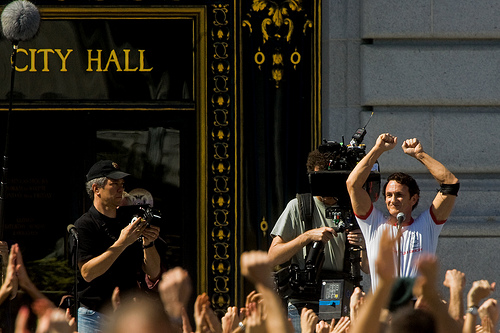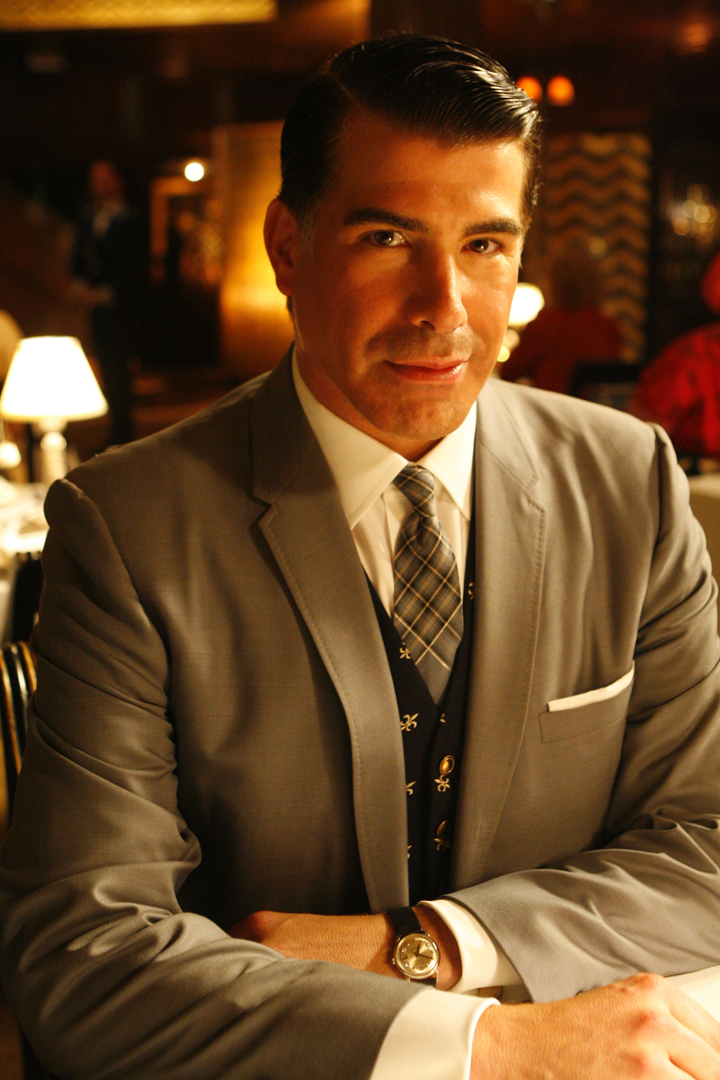"Milk", the film
- 5 minutes read - 1031 words

When I first moved to the Bay area I would see mentions of Harvey Milk’s name in The SF Chronicle like the name was common knowledge. I had no idea who he was and I suspect the same is true of most of America today. Gus van Sant’s movie about Milk is an attempt to educate the post-1980’s-born generation about the man’s life, his work, and to demonstrate that life, liberty, and the pursuit of happiness are rights that all Americans are entitled to pursue by birth in this land.
Milk had lived a closeted life in New York State and eventually city before choosing to head to the City on the Golden Gate well into his middle age. Setting up home with his partner in the Castro, he is portrayed as part a small gay minority transformed a forgotten and largely-abandoned neighborhood into a community that accepted those who had been misunderstood or persecuted their entire lives.
As he and Scott, played maturely by the dangerously-close-to-stoner-typecast James Franco, start over on the West Coast, a sense of peace about finally simply being allowed to be themselves fills them and the audience with a feeling of peace and optimism. Despite running into a frosty welcome in response to their honesty in their lifestyle, Milk and Scott settle into a home and open a small camera store that eventually became a locus for political activism for the inchoate “Gay Rights” movement.
van Sant’s cleverness in helping evolve the audience’s understanding of gay life is to portray the “gay” couple as well, simply, “the couple”. That is, their lives are as quotidian as those of the heterosexual majority.
But Milk was not destined for a life of being peaceably out. As a response to limited local actions that threaten the ability to live both out and at peace as a citizen, Milk works to ensure that sexual-orientation becomes a grounds upon which the City does not discriminate. However, his actions are not set within a vacuum. Larger national forces are trying to push this open life back into the Salvatore model.

“The ladies love me, I’m Italian”
As the scope of the anti-Gay movement grows, van Sant moves Milk’s argument from a strictly-gay context, to a human context. The message being that if any group of us is not free, any of us risk loss of rights at some unknown point. In is this message that allows this film to leave the appellation of being a “gay movie” and instead shows it to be an “American Movie”. It is at the point that the reasoning of right to associate and right to privacy become most universal that the tragic climax of Milk’s life is portrayed, cutting short the promise that had so-recently gained momentum.
van Sant is canny, and knows that gay intimacy is, still, even in the most liberally-minded viewer’s estimation, a topic that could direct attention away from the goal of presenting the life of a daring politician. van Sant never loses sight of the larger goal, to render Milk’s life with truth and sensitivity, by trying to “freak out the straights” by going for the shock of explicit gay romance on screen ( besides, “Shortbus” pushed that to the end of the line already ). Lauren observed that peeks of intimacy are filmed surreptitiously, through windows or around corners; they were glances into a life behind closed doors that really was none of our business to begin with. I commend his thought-out approach that renders R-rated intimacy in a fashion that looks like R-rated intimacy in any movie at any “mainstream” movie house.
The performances are solid all-around, but the movie is, effectively, Sean Penn’s work. Penn has aged nicely into the part and captures, from the footage I recall of Milk himself, his huge smile and mannerisms. I think Penn has the tendency to make his physical affectations for characters a bit over-large based on stereotype. His verbal and physical posturing of Willie Stark in “All the President’s Men” were distracting and, as a person born South of the Mason-Dixon, felt a bit clownish, informed by stereotype. I do not know if his portrayal of Milk’s physical “style” does the same this time out in term of gay stereotype.
Bridie asked, via Facebook, if Sean Penn was “that great”. To my eyes, this movie was, like “…Men” a reminder to the Academy that “Hey, Sean Penn is a serious actor”. I suspect a nomination is in the cards. Not that I wish to wax cynical overmuch, but I suspect that the Academy will give him the nod on political grounds, as a big “Eff-You Proposition 8” message.
Speaking of Prop 8, could the film have been any better timed? Gay marriage would be one of the last impossible dream landmarks that Milk and the movement he represents aspirie to attain. Had Prop. 8 gone the way other than the way it did, this movie would have seemed prescient. As it is, it gives hope to those in the movement that their climb is not as steep as his was.
The film also catches the Obaman zeitgeist suggesting that the cure for dissatisfaction can never be disaffection. The film shows how, pre-internet, the determined were able to unite and advance an idea that was even less generally accepted than it is today. It suggests that those who are dissatisfied with the status quo should look first to themselves and their community for change. Milk as seen in the film acted repeatedly against laziness, against complacency, and against his own comfort. He was brave and plucky in that quintessentially American way.
As always, it was a joy to see San Francisco in film. It reminds you of the unique communities that live there, the fog, the sunny districts, and all that fine Deco architecture that ex-Franciscans love to re-live with the bonus of none of the urinary odor that hangs over many parts of it. Curiously, there’s a joke in the movie about that scent’s endemic hold on the neighborhood areas around the Castro / Market intersection.
It was interesting to note that here, in Austin, Texas, not quite the most